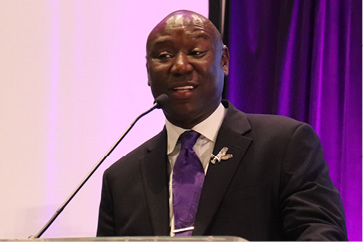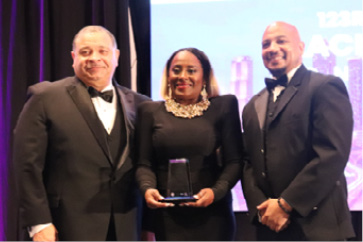ATLANTA—The 123rd annual National Black Business Conference, which took place at the Hyatt Regency Atlanta, honored the best in business, education, media, government, and non-profits during a “Booker T. Washington Black-Tie Awards Gala” on August 26.
Award categories included the Booker T. Washington Lifetime Achievement, the National Black Business of the Year, the National Black Chamber of the Year, the National Black Organization of the Year, the National Business League of the Year, the National Corporation of the Year, the National HBCU (Historically Black College/University) of the Year, the National Mayor of the Year, the National Black News and Media Award and the National Pan-African Business of the Year. The list of winners is below.
- Booker T. Washington Lifetime Achievement Award: Attorney Fred David Gray
- National Black Business of the Year: Eminent Future
- National Black Chamber of the Year: Delaware Black Chamber of Commerce
- National Black Organization of the Year: National Black MBA Association
- National Business League of the Year: Atlanta Business League
- National Corporation of the Year: Comerica Bank
- National HBCU of the Year: Clark Atlanta University
- National Mayor of the Year: Steven Reed, Mayor of Montgomery, Alabama
- National Black News and Media Award: Rolling Out Magazine
- National Pan-African Business of the Year: Baw Bab Technology, Inc.
Civil rights attorney Ben Crump delivered a keynote speech at the gala. He spoke on the enemies of equality attacking Black and other non-White people in America.

“They are passing legislation to ban the teaching of Black history in the classroom. They are passing legislation to ban Black authors and books. They are passing legislation to ban diversity, equity and inclusion programs,” he said. “Now more than ever, we must be unapologetically fearless of Black life, Black liberty and Black humanity.”
His message revolved around taking action now to save future generations from the psychological trauma of racism and White supremacy. “We have to stand up and make sure our children know we will stand up for them, we will speak up for them and we will fight for them,” he said.
Atty. Crump mentioned two cases as examples of the threats to Black economic progress and what can happen when Black people overcome and prevail. The first example was the case of Arian Simone and Ayana Parsons, two Black women who started a venture capitalist fund called the “Fearless Fund.” The two are graduates of Florida A&M University, a historically Black university in Tallahassee, Florida, and have raised almost $100 million to give grants to women of color endeavoring to start businesses. The two women are now being sued by Edward Blum, the man who was instrumental in the Supreme Court outlawing affirmative action in college admissions programs.
“They said we’re not scared, we’re not afraid, we are fearless,” Atty. Crump said, quoting the two women. “He picked the wrong sisters.”
Atty. Crump voiced the importance of ensuring that Black children are well-armed with intellect, diplomacy and strategic thinking to say, “Not on our watch” and to win the war being waged. “The enemies of equality will not win this war as long as we make sure that our children are more intelligent than those who seek to oppress them. And that’s what this battle is about,” he said.
The second example he brought up was the case of Henrietta Lacks. He served as one of the attorneys for the family of the Black woman whose cells were taken without consent and without financial compensation.
“Henrietta Lacks, in 1951, was a 31-year-old beautiful, intelligent Black woman. She was a wife and a mother of four children. She went to Johns Hopkins Hospital. They diagnosed her with cervical cancer,” Atty. Crump described. Ms. Lacks was a victim of medical racism, as doctors stuck the inside of her stomach area with radiation rods. She passed away a few months later. “They were experimenting with her,” the attorney said. “They were trying to see if the human cell could regenerate outside the human body, and we don’t know how many Black people they experimented on outside of Henrietta.”

“They took the cells out of Henrietta Lacks, and this sister’s cells did what no human being in the course of human history had ever done. They regenerated outside of the human body … every 24 hours for 70 years and still going today,” he continued.
According to her family, Ms. Lacks died a horrible, painful death. Though her cells are still being used today and though pharmaceutical companies have made billions upon billions of dollars off of her cells, her family had not received one penny. Her own children and grandchildren could not afford the quality healthcare that those with resources, who are benefiting from Ms. Lacks’ contribution, could afford.
Atty. Crump detailed the court conversations that took place. He and the family’s legal team argued that since Ms. Lacks’ cells generate every 24 hours, causing companies to continuously make money from the cells, then her family should get some of the money. One question posed was, what if years down the road, her great grandchildren want in? The counterquestion Atty. Crump posed was, “What if they would’ve treated her like a White woman by giving the family a commission, getting consent and giving the family intellectual property and say.” He argued that if Henrietta Lacks was a White woman, her family would’ve automatically benefitted.
The family and legal team successfully settled the lawsuit, and Netflix is now making a documentary based on the case and the settlement.
Atty. Crump used the two cases to tell the listening audience attending the gala to continue fighting.
“When we fight for the least of these, then what we are doing, brothers and sisters, are helping America be America for all Americans, and now more than ever, we have to be intentional about fighting for people to have a seat at the table. We have to do our part,” he concluded. “I tell you, we can’t depend on anybody else.”













